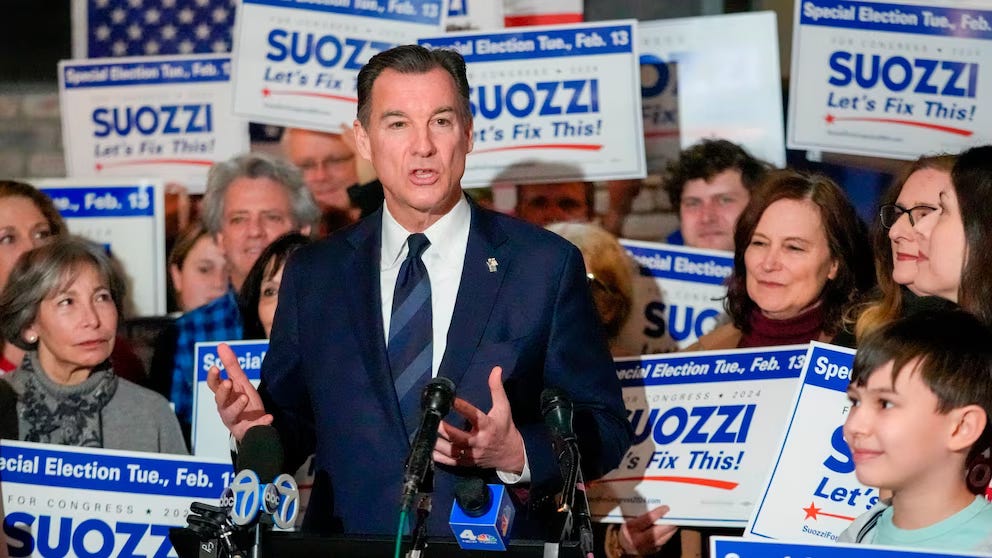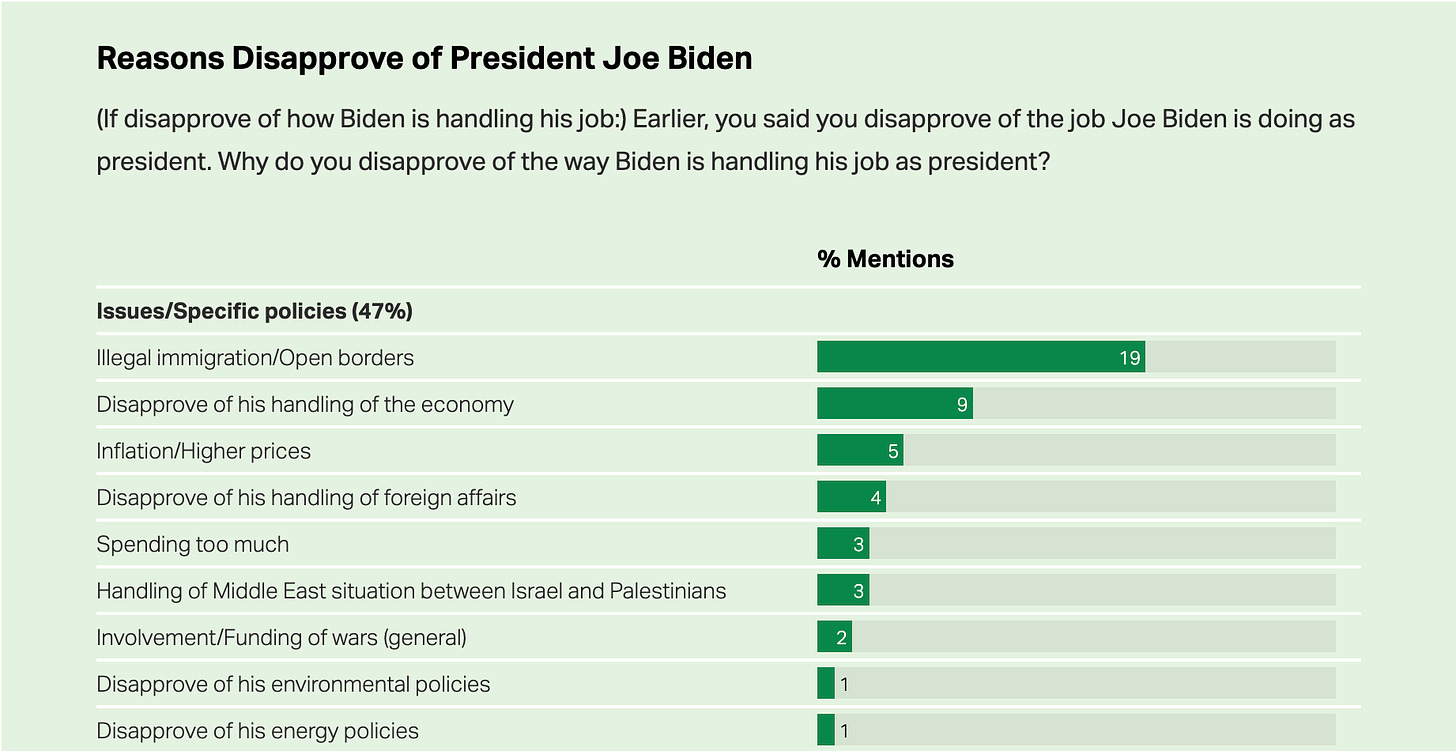Tuesday’s special election is being spun every which way by the two parties. So, what did it really mean? I’ll tell you everything you need to know below. 🤓
On Tuesday night, in the first House special election of the year, Democrat Tom Suozzi beat Republican Mazi Pilip 54% to 46% in New York’s 3rd district.
Everyone and their brother immediately rushed to tell you what that meant and who deserved the credit or blame.
“To those waking up in Europe/UK, Democrats in the US just won another really important election, by a big margin,” tweeted Simon Rosenberg, a prominent Democratic strategist. “Disregard our polls. MAGA is a failed politics here, and keeps losing. And it will lose again this November.”
“We just lost another winnable Republican House seat because voters overwhelmingly reject Donald Trump,” said former South Carolina Gov. Nikki Haley.
And then, of course, there was Trump.
But, spin aside, what does the result in a suburban New York district really tell us about 2024? And, as importantly what doesn’t it tell us?
Let’s dig in.
Takeaway #1: Immigration is not a silver bullet issue for Republicans (as many in the party have cast it). Rather than hiding from the situation as the border, Suozzi leaned into it — embracing the bipartisan Senate deal on immigration.
“If I was in Congress, I would absolutely support it,” Suozzi said. “It’s what people want and people deserve action on this crisis, at this time.”
Pilip, on the other hand, said she was opposed to the deal — calling it a “non starter” that “simply puts into law the invasion currently happening at our southern border.”
Pilip’s rhetoric, you probably noticed, echoes that of Trump himself — who not only opposed the Senate immigration compromise but also spends 15 minutes (at least) in every one of his stump speeches painting a dark picture of the border.
To be clear, Trump isn’t going to stop doing that. And just because Suozzi won on Tuesday doesn’t mean immigration isn’t a major problem for President Biden. It is — as evidence by new Gallup polling that shows, among people who disapprove of the job Biden is doing, immigration is the leading issue cause of that unhappiness.
But, what Suozzi’s win reveals is that at least some voters are persuadable on the issue of immigration — and that Democrats have to play offense (be FOR something) rather than just take GOP incoming on it.
Takeaway #2: Democrats needed this — and got it. Politics, like it or not, is about narratives and momentum. Going into the special election, the narrative for Democrats was, well, pretty bad: Their aging presidential candidate had been credibly accused of having major memory problems.
Had Suozzi lost on Tuesday, it would have been another data point in Democrats’ doom — Biden’s unpopularity was dragging their candidates down (Biden had won this district by 8 points in 2020) and they had no way out.
But, Suozzi won! And while that win is the result of a lot of local factors (more on that below) that aren’t easily replicated in the presidential race, the fact of the matter is that his victory gives the party something positive to talk about. And helps convince donors, activists and, yes, candidates and elected officials, that the sky isn’t falling. Not yet at least.
Takeaway #3: Democrats are really good at winning special elections. As Simon Rosenberg noted above, his side just keeps winning special elections — even as Republicans (and the media) insist the political landscape doesn’t look good for their side.
And there’s merit there! Elections matter far more than any poll. It’s when rubber meets road, proof in the pudding and all that.
But, there’s also plenty of data to suggest that while Democrats are clearly better than Republicans at winning special elections, the assumption — that Rosenberg and plenty of other Democrats make — that this bodes well for a regularly scheduled general election is off base.
Here’s the New York Times’ Nate Cohn on that fact:
But special electorates bear no resemblance to the general electorate or the broader pool of registered voters, based on an analysis of voter registration records from more than 50 special elections since the start of 2022. They may offer insight into which party’s activist base is more energized, but not much more.
In the typical special election, half of voters are 65 and over. Nearly every special election voter has participated in a recent primary election. Almost everyone is a registered Democrat or Republican. Young voters, irregular voters and independent voters are much scarcer. The nonwhite share of voters is typically smaller. A general election poll with these demographic characteristics would be laughed out of the room.
Winning is always better than losing. But Democrats should be wary of reading too much into any one special election win.
Takeaway #4: Candidates matter. Suozzi was a well known name in the district, having represented it for six years in Congress and, prior to that, as a county executive. Pilip was a virtual unknown who didn’t help her cause by holding very few public events (inexplicably). Voters knew Suozzi as a moderate — and so the Republican attacks on him as some sort of wild-eyed liberal just didn’t hit home.
Democrats also outspent Republicans heavily in the district — knowing how devastating a loss would be.
And then there is George Santos, the disgraced Republican House member whose expulsion from Congress created the special election in the first place. Santos, a serial liar who became a national figure of disgrace, did no favors for the Republican brand in the district.
NONE of those factors exist in the current presidential race. Biden and Trump are universally known. Both sides will spend massively (and close to equally) on the race. And Santos isn’t going to be a factor at the top of the ballot.
All of which means Democrats should slow their roll about how Suozzi’s win means Biden is going to win.
Takeaway #5: Speaker Mike Johnson’s job just got even harder. Johnson hasn’t exactly covered himself in glory during his brief tenure as Speaker. But, I am not sure anyone — Democrat or Republican — would be able to succeed with a majority as slim as the one the Johnson is dealing with.
And, that majority just got a seat smaller on Tuesday night. Republicans now control 219 seats to 213 for Democrats. Meaning that Johnson can only lose 2 GOP votes on ANY issue and still pass legislation. It’s a brutal gauntlet.
On Tuesday, just before the special election in New York, the House voted to impeach Department of Homeland Security Secretary Alejandro Mayorkas by a vote of 214-213. That vote would now lose — once Suozzi is sworn in.
It’s a miserable path ahead for Johnson. And Tuesday night made it that much more miserable.







I beg to differ on the idea that the factors which propelled Suozzi to victory don’t exist in the 2024 general. We have a disgraced , serial liar who has a raucous but small ardent majority running against a moderate fella with a fairly successful resumé. We have the coffers of the Republican Party sucked dry by one candidate, leaving the rest dependent on individual donors and help from the PACs of the likes of Mitch McConnell. And..,.we have an electorate exhausted by the antics of a Party gone rogue, tired of having no problems solved while the folks they’ve elected engage in culture wars and posturing. Although the media makes a big deal out of Biden’s age…sentient Americans just want Donald J Trump off the national stage along with his partisan pinocchios. We know that Biden can do it, and we’ll elect a Democratic Congress to help him.
Chris, I find it remarkable that no one is pointing out that it is GOP governors busing migrants to NYC and dumping them. They are exacerbating the problem, then campaigning on the same problem that they are amplifying. That is next level cynicism.